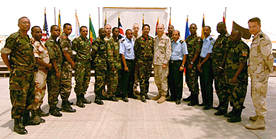 The Voice of America reported yesterday on the Department of Defense's plans for its U.S. Africa command, or AFRICOM.
The Voice of America reported yesterday on the Department of Defense's plans for its U.S. Africa command, or AFRICOM.
While NPR reports that the idea to create the new command was “has kicked around the halls of the Pentagon for more than a decade,” the command was recently created so that US-Africa military liaisons be united under one command, as opposed to three in the past (U.S. Central Command, Pacific Command, European Command).
The unification of these units into a single command was intended to give it more focus, and the ability to act more nimbly to events that transpire on the continent, says Charles Kosak, Director of African Affairs in the office of the secretary of defense, in an interview with VOA.
VOA reports that the Africa Command is scheduled to reach full operational status about October of this year, when a full complement of 1,300 personnel will be in place at its interim headquarters at in Stuttgart, Germany. The Defense Department hopes eventually to have regional offices in various parts of Africa, but no new military bases are reported to be a part of the command.
The leaders of the new command, who met at a conference at the University of Southern California on Friday, explained that AFRICOM was designed with an understanding of the ties between security, development and diplomacy,” and therefore “will not take a leading role in African security,” but will “offer support to African governments and regional organizations.”
The Defense Department-run website for AFRICOM desribes it as “a different kind of command” that “reflects a much more integrated staff structure, one that includes significant management and staff representation by Department of State, U.S. Agency for International Development (USAID), and other U.S. government agencies involved in Africa. The command will also seek to incorporate partner nations and humanitarian organizations, from Africa and elsewhere, to work alongside the U.S. staff on common approaches to shared interests.”Kosak added in the VOA report that the integration of staff structure is intended “simply to have these skill sets in the command so that the USAID rep[resentative] can help the Department of Defense, can help Africa Command, work better with USAID, with its multitude of programs on the continent.”
This discussion comes amid concerns more broadly that the Department of Defense has began to overstep its mandate and take on more diplomatic and development work usually left to the State Department and USAID.
Nicole Lee of the Washington-based TransAfrica Forum, an advocacy group, expressed at the USC conference a concern that the restructuring of AFRICOM and its mandate signals a shift in US-African relations away from traditional diplomacy. According to the VOA, she said: “I think the biggest concern with AFRICOM is no one really is clear on what exactly it's going to do. When the Defense Department is asked regarding the issues that AFRICOM is going to deal with, it sounds a lot like what the State Department is supposed to be involved with and leading on.”
Jendayi Frazer, the Assistant Secretary of State for African Affairs testified her support for the creation of AFRICOM before the Senate Foreign Relations Subcommittee on Africa in August of 2007. According to her testimony it would seem like things between Defense and State on the issue of AFRICOM were getting off to a great start:
“From the inception of AFRICOM, the State Department has been closely involved in the planning process, beginning last fall when the Department of Defense established its AFRICOM Implementation Planning Team. Both the Bureau of African Affairs and the Bureau of Political-Military Affairs assigned senior officers to this planning team, working with Department of Defense officials full time for many weeks to address the myriad of issues that arise when this type of major inter-agency collaboration is envisioned. Several other State Department bureaus also had officers participating, bringing functional expertise to key portions of the planning process. This process has largely occurred in an atmosphere of cooperation and collaboration, with both Departments sensitive to the requirements and concerns of the other. The result, to date, is the development of a framework that is supportive of both U.S foreign policy interests as well our regional security objectives.”
She closed her remarks by saying “The Department of State views the creation of AFRICOM as a major advancement in our comprehensive Africa policy and engagement strategy. It is the beginning of a long and fruitful collaboration. It is, in many ways the marriage of State's expertise and authorities with the military's resources and security experience, and we are excited about it. I would be glad to take any questions that the committee might have.”
But according to reporting back in November by the Associated Press, there has been criticism of AFRICOM coming from “within the U.S. government itself, notably from State Department officials.”
Kurt Shillinger, an analyst at the South African Institute of International Affairs, told the Associated Press: “Some officials at the U.S. Agency for International Development worry their humanitarian programs could be “stigmatized” by direct links with the military, which has melded aid programs with combat operations in Iraq and Afghanistan- wars unpopular in most of Africa.”
A/S Frazer was the keynote speaker at the USC conference on Friday. We will keep our eyes peeled for a transcript of her remarks either posted on the USC or State Department site. In the meantime, those of you looking to learn more about AFRICOM can look here: